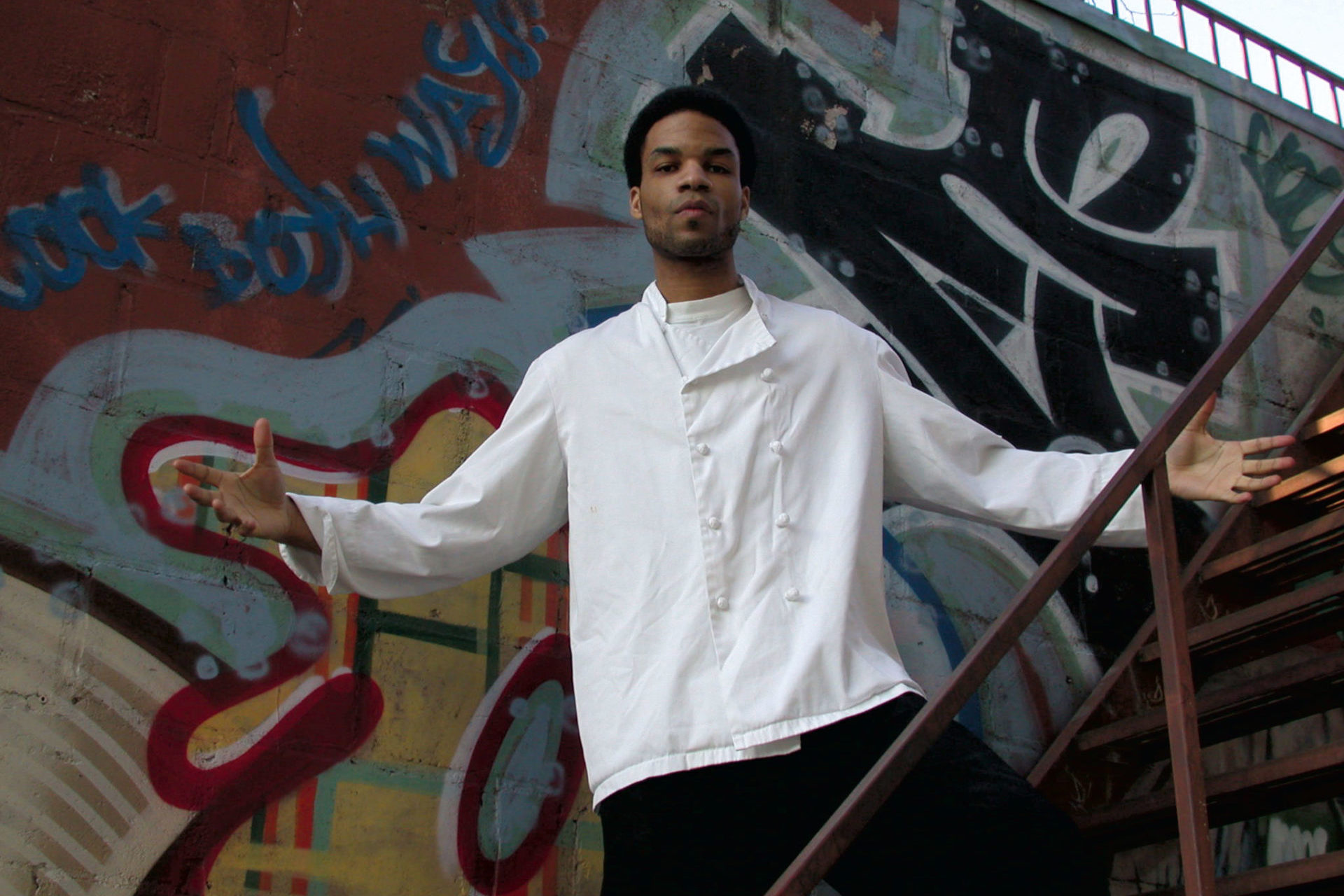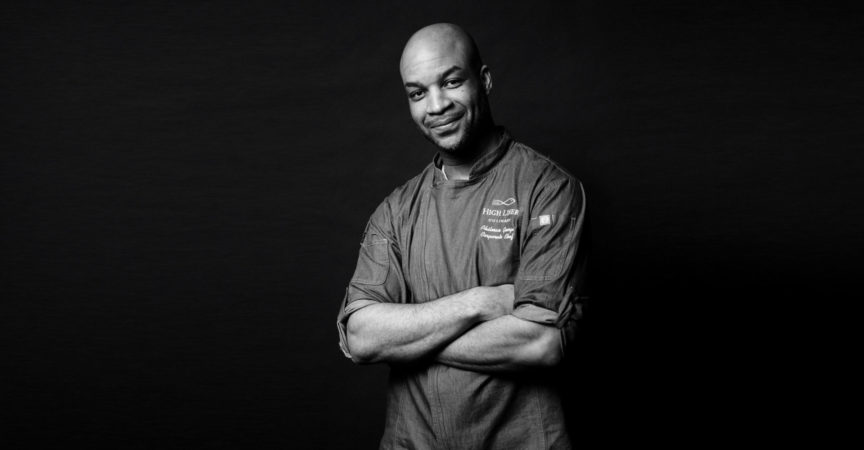Black in the Kitchen: Chef Philman George
By Elle Asiedu, The Re-seasoning Coalition
A long-time restaurant chef and the first Black corporate chef at a major Canadian seafood brand, Philman George looks back at two decades in the foodservice industry. His verdict? “The industry needed to change, not me.”
Growing up in a single parent household in Toronto’s Regent Park, Chef Philman George quickly learned that he had to work for what he wanted.
An avid basketball player and a charming, good natured teenager, one of his first experiences with the concept of “doing more to get more” came when he wanted the Grant Hill sneakers to help him excel on the basketball court. That was in 1996 when baggy clothing was in, the hip-hop world was thriving and the idea of a career in foodservice was not even the smallest blip on Philman’s radar. He wanted to be a journalist; telling the stories of his neighbourhood, the Caribbean and the world of hip-hop and rap that fueled his days and nights.
But before enrolling in the journalism program at Carleton University, Philman had basketball shoes to buy and a new job to help secure them. “The foodservice industry was accessible as the entry-level positions required very little experience and help was mostly needed in the evenings and weekends which worked perfectly with my high school schedule,” he recalls.
A WHOLE NEW WORLD
While Philman had always appreciated a good meal and had developed a set of cooking skills as part of his upbringing in a Caribbean home, his lack of focused interest in the culinary world meant that his destiny in the industry did not begin to unravel until well after his freshman post. Graduation from George Brown’s culinary school at the dawn of the new millennium soon followed.
“I actually never considered it as a career until I was three years in and working in an upscale, white-tablecloth restaurant,” Philman remembers. “Prior to this, my experience was in English-style pubs where I had moved up the ranks from dishwasher and prep cook to assistant kitchen manager.” The progression of his career had started at that point, but it wasn’t until he was working in a casual fine-dining environment that the Head Chef recognized his talent and recommended he pursue it as a career.
That was to be a defining moment that would lead him to an unprecedented post in corporate foodservice.
But at that time in Toronto, the foodservice industry, and especially back-of-house positions in restaurants across the five-star scale, were notoriously White. While the diversity of prep lines and finishing stations has increased over the last decade, there’s still more to be done to bring a new set of voices, talent and perspectives to the forefront. Being Black in the kitchen in the late 90s and mid-2000s came with a host of complexities; many of which were highlighted during his various stage placements.
FROM NOVICE TO EXPERT
As fine dining establishments and contemporary restaurants were still holding onto traditional values, an employee’s first day in the restaurant kitchen was unpaid. It’s what’s known as a “stage”, an opportunity to prove your skills, temperament, and overall fit to your potential employer and colleagues. It’s a moment in time when the cream is separated from the milk and where a friendly glance from someone like you can go a long way to alleviate the stress of this trial by fire.
While the overall environments were as positive as they could be despite the toxic, military-style structure frequently seen in well-run kitchens, Philman often found himself without the familiar nod, a common acknowledgement of another Black person at work. “As I look back, I’m not sure I ever did a stage where I wasn’t the only Black person in the kitchen,” he says. “I didn’t think for a second that my skin colour would prevent me from getting a job in any kitchen, especially after showcasing my talents. I don’t think it ever did.”
But while Philman never experienced being called the N-word or finding himself on the receiving end of dirty looks or whispered insults, his experience with anti-Black racism in the foodservice industry had a very distinct, Canadian flavour. To hear him tell it, “None of the cuisines that commanded top dollar or that were honoured with fine dining status had any Black influence. I had never seen anyone in a position of authority who was Black and once or twice, I found myself wishing I had paid more attention in French class since French cuisine and French and European chefs were regarded as world class.” In hindsight, however, Philman notes that speaking the language likely would not have made a difference.
“I felt like I was always on the outside looking in, even though I was deep inside the inner workings of the industry.”

THE PROOF IN THE PUDDING
This passive-aggressive, but structurally-empowered type of discrimination still resonates in the industry, despite what many think. And while other sectors have been quick to recognize and address the oppression and racism in their workplaces, many of those within the food industry are still struggling to admit there’s a problem.
Unwritten rules continue to dominate kitchens staffed by chefs like Philman who find themselves at a disadvantage when it comes to moving up the ladder—no matter how hard they work. “I was always welcomed in the kitchen because I was a hard worker and a fast learner with a positive attitude,” he recalls, “but I learned quickly not to ask for a raise. Advancement opportunities simply were not afforded to me. My ceiling was already predetermined. It was never stated, but it was felt and observed. No one in management looked like me—my future was clear.”
After more than a decade in increasingly senior positions and then one particular
instance where he was passed over for promotion to Executive Chef despite having the experience and the support of back-of-house staff, Philman decided to leave his job as a Chef de Partie at a well-known golf club in the GTA for an opportunity he wasn’t as familiar with.
It will take this industry a long time to show measurable change, but I know the satisfaction of a slow-cooked meal and I’ll be stirring the pot for as long as I can.”
The role was Culinary Manager, later leading to the Corporate Chef position at seafood giant High Liner Foods. It came with an office, a comfortable salary and a revolutionary adjustment: the typical Monday to Friday work week. “By that time I had achieved my dream of being an Executive Chef and was in my early 30s, ready for a challenge,” he notes. “The job description at High Liner excited me because I would be directly influencing the company’s culinary footprint through recipe development, writing and presenting. Plus, I wouldn’t have to get my ass kicked during service on a Friday night anymore,” he laughs.
MOVING ON AND MOVING UP
Philman’s transition into corporate foodservice provided him with an opportunity to combine his childhood passions, university aspirations and hard-fought culinary expertise and led to what has become a decade of fulfillment with the Canadian seafood mainstay.
“My first day at the company was amazing. I was extremely fortunate to report to Ron Waters, a fantastic leader and the Director of Foodservice Marketing. He showed to me my office which was right next to my test kitchen,” he recalls, smiling. “It’s amazing how a few windows in an office can make a chef feel extra special!” Working on the corporate side of foodservice was a blessing Philman might not have expected, but it was a decision that has the potential to change the entire industry from the inside out.
In his current role as High Liner’s Corporate Chef, he has a bird’s eye view of the industry and has noticed that the more important the role in a company, the less diverse it gets. This realization was troubling, because it echoed the patterns he had seen in the dining space. Philman’s view is that Canada is too multicultural to fail to engage the rich cultural diversity of its Black population. He believes this is missing in a food industry ravaged by the same structures of systemic racism as other sectors. “This industry has the ability to excel and grow by regularly including Black cuisine and Black chefs as major components of our culinary landscape,” he explains. “To help get this industry back on its feet, organizations of all sizes need to actively choose to be different, buck the trends, and welcome Black people and other people of colour into every level. I don’t want to be part of a handful of unicorns in 2033.”
To this end, the corporate leader has taken on a second full-time job as Co-founder of The Re-Seasoning Coalition, a non-profit organization dedicated to increasing the representation of Black Canadians in foodservice through research, programming, and content that showcases the reality of being Black in foodservice. It’s yet another line on his culinary CV that Philman is sure will pay off. “It will take this industry a long time to show measurable change, but I know the satisfaction of a slow-cooked meal and I’ll be stirring the pot for as long as I can.”
Stay tuned to menumag.ca for more stories in The Re-Seasoning Coalition’s Black in the Kitchen digital series

To learn more and sign up for the Re-Seasoning newsletter, visit: thereseasoning.org
To watch the Re-Seasoning webinar for research and insights, visit: restaurantscanada.org









